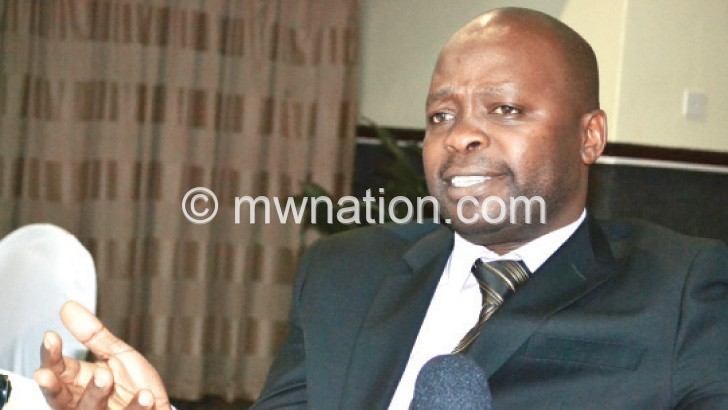Debate on 50%+1 extension
Malawi Electoral Commission (MEC) decision to extend application of the 50-percent-plus-one vote threshold in deciding winners to parliamentary and local government elections has drawn mixed reactions from stakeholders.
In separate interviews on Tuesday this week, political parties backed the electoral body on the decision while political scientist Blessings Chinsinga, an associate professor at Chancellor College—a constituent college of the University of Malawi, said the arrangement will be difficult and expensive because a majority of members of Parliament (MPs) and ward councillors do not amass up to half of the votes cast.

Said Chinsinga: “I should honestly say that I don’t know anywhere else this is happening. The issue here could be for Parliament to go back and make it explicit that for these two other elections [parliamentary and local government], the requirement is simple majority.”
In the May 21 2019 Tripartite Elections, The Nation analysis of the results shows that only 66 candidates in the 192 constituencies contested out of 193 hit the 50-percent-plus-one vote threshold. The results show that 23 of the candidates were affiliated to Democratic Progressive Party (DPP), 22 to Malawi Congress Party (MCP), 17 were independents, two were for UTM Party and one each for United Democratic Front and People’s Party.
This means that if MEC were to apply the 50-percent-plus-one vote threshold parliamentary election reruns would have been conducted in 126 constituencies.
In an interview on Tuesday, MCP publicity secretary the Reverend Maurice Munthali said there was nothing the party could do because the order that has influenced MEC’s decision came from the court.
He said: “If that is law, we have to abide by it. We are only going to strengthen our operations on the ground, our strategy; and civic educating our people to vote for our candidates.”

On her part, DPP secretary general Grezelder Jeffrey also said if the court interpreted majority as 50-percent-plus-one then political parties, including DPP, should respect the decision.
She said: “It’s the duty of parties and candidates to work hard on the ground to get 50-percent-plus-one. So, we don’t have any problem with it.”
UTM Party secretary general Patricia Kaliati said while her party was not expecting the extension of 50-percent-plus-one to parliamentary and local government elections, it had no problem with it.
While welcoming the system, UDF secretary general Kandi Padambo faulted the DPP administration for rejecting the Electoral Reforms Bill that included the adoption of the 50-percent-plus-one vote system in 2017.
He said: “We should not blame MEC, but the naivety and myopia of the government of that time. We urged law makers to make sure that they make appropriate amendments to make sure that 50-percent-plus-one system applies only to the presidential election.”
But PP publicity secretary Ackson Kalaile Banda said his party was still consulting its legal team, as they have not found anywhere in the world where the system applies to parliamentary and local government elections.
Briefing journalists in Lilongwe yesterday, MEC chairperson Chifundo Kachale said the commission arrived at “this rather difficult decision” in the spirit of seeking to obey judicial directions impacting upon its mandate as the electoral management body and after reflecting on the full legal ramifications of the October 7 2020 High Court of Malawi decision on its mandate.
He said: “In the first place, it is important to acknowledge that our initial understanding had been that the Malawi Supreme Court of Appeal decision of 8th May 2020 [in so far as the question of registration of new voters and candidates is concerned], was confined to the fresh presidential election; but as it has turned out, we were mistaken in that belief.”
Section 96(5) of the Parliamentary and Presidential Elections Act stipulates that “in any election, the candidate who has obtained a majority of the votes at the poll shall be declared by the commission to have been duly elected”. Section 80(5) of the Local Government Elections Act also has a similar provision.
Kachale, a judge of the High Court of Malawi, observed that the recent court decisions have adopted the Black’s Law Dictionary definition of ‘majority’ as the proper interpretation of the term within Section 80(2) of the Constitution.
He said: “In the context of the direction to adhere faithfully to the decision of the 8th May 2020 from the Supreme Court, the commission has, therefore, found no basis for distinguishing the term ‘majority’ as used in the Constitution and in the PPE Act.”
Kachale said the absence of run-off provisions should not be a basis for finding convenient meanings that cover or conceal the inadequacies in the law.
In a statement announcing the deferring of the November 10 by-elections in three of the five constituencies, Kachale said parliamentary and local government by-elections will be determined by the 50-percent-plus-one vote system.
He said the decision was informed by the judgement of the High Court of Malawi sitting as the Constitutional Court and upheld by the Malawi Supreme Court of Appeal, the definition of “majority” in determining a winner in the election is 50-percent-plus-one.
The by-elections have been deferred in Mangochi West, Mangochi North East and Phalombe North constituencies.





